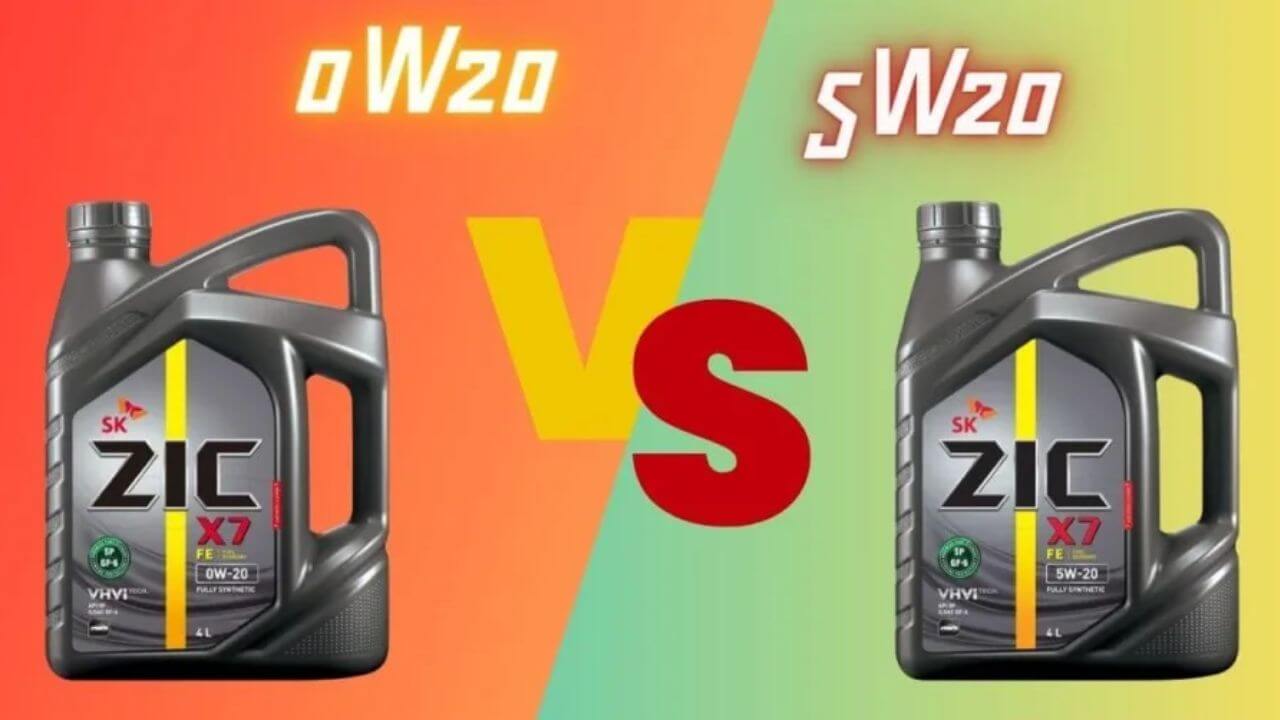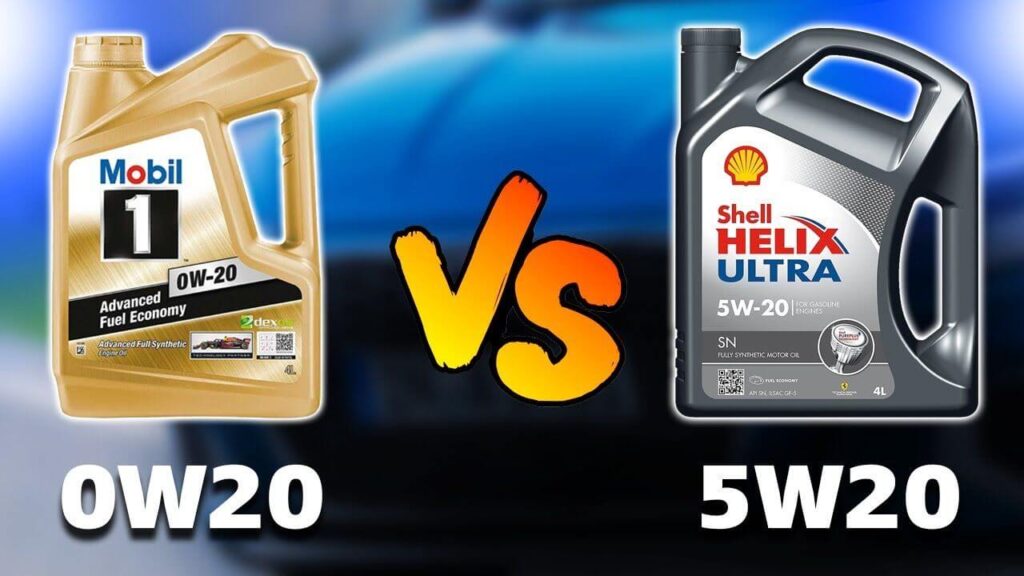Discover the key differences between 0W20 and 5W20 motor oils, their impact on engine performance, fuel efficiency, and how to choose the best oil for your vehicle in various climates. Get expert insights and make informed decisions today.
0W20 Vs 5W20, In relation to keeping your engine in good condition, the most important thing is to use the right motor oil. Of the various types of oil grades, 0w20 versus 5w20 is a very controversial subject. There are some advantages and uses of both grades, and when you know the finer differences, you can make the best use of the engine performance, fuel and longevity. This article will go into details of these two common oil viscosities, illuminating their nature, advantages, and optimal application conditions so that you can make an informed choice.
What is Motor Oil Viscosity and its significance?
The major purpose of motor oil is to lubricate parts of the engine that minimize friction and wear as well as assist in heat dissipation and corrosion prevention. Motor oil grade numbers and letters such as 0w20 and 5w20 mean the viscosity or the thickening and flow properties of the oil at varying temperatures. The W means winter and represents a cold temperature performance. The figure in front of the W is the viscosity of the oil at low temperatures, the lower the number, the easier the oil flows when it is cold and this is essential when starting the engine in cold weather. The value following the W means the viscosity of the oil at standard temperatures of operation.
Comparing the differences: 0W20 vs 5W20.

Automobile tests and professional research indicate that 0w20 motor oil is pumpable down to about -40 F ( -40 C), and at extremely cold temperatures (very low temperatures), it flows nearly 35 times faster than 5w20. In the meantime, the low temperature flow limit of 5w 20 oil is approximately -25F (-32C), which is adequate in milder climates, but not so effective in colder climates. This subtle distinction can be important in areas where the cold is extreme.
Emily Tanner, one of the most renowned lubrication engineers, states that the oil with the correct viscosity, in particular, in cold weather, is crucial since a rapid start lubricated engine could avoid early wear and tear on the engine and its life may last longer as well. This explains why manufacturers tend to recommend the use of 0w20 with modern engines and lower temperatures (Tanner, 2024).
Economy and protection in Fuel economy and engine.
Fuel efficiency is another consideration that is very necessary in the 0w20 vs 5w20 oil debate. The thinner oils upon start-up trim the engine drag, and less energy is needed to circulate them, which goes directly to improved fuel economy. Several comparative tests have demonstrated that engines with 0w20 oil can achieve a 13 percent to 3 percent gain over the miles-per-gallon of engines with 5w20, particularly in turbocharged engines or in hybrids with a high start-stop frequency. This slight difference can result in significant fuel savings in the long-run among drivers that travel about 12,000 miles annually.
Regarding engine protection, the two oils achieve good lubrication once the engine attains its operating temperature, however, 0w20 has an advantage in terms of a faster start-up lubrication. This is particularly beneficial in engines with a turbo that rotate at high revolutions per minute and with higher thermal load where faster oil flow is needed to maintain vital parts.
What to consider: Regional and Vehicle Compatibility?
The decision to use 0w20 or 5w20 oil also greatly relies on the design of your car and the climate at your location. Since 2015 Modern cars, especially those equipped with a turbocharged engine or a hybrid, tend to recommend the use of 0w20 synthetic oils because of their advantage of cold flow and efficiency. On the other hand, vehicles with older engines or those that run in warmer climates can be well run with 5w20 oil.
As an example, 0w20 is strongly suggested in areas where temperatures often fall below -25 o C ( -32 C ) to guarantee engine start up protection. But when ambient temperature often does not drop below that value, like in temperate areas, 5w20 may be suitable,and more economical.
Before changing the oil grades, it is very important to follow your owner manual or manufacturer recommendations because changing the viscosity outside of the recommended range may affect performance of your engine or warranty.
Trends in Synthetic Oil and Environment Impact.
Even the latest synthetic oils, such as 0w20/5w20 help to produce less emissions because they allow an engine to work more effectively and efficiently and with less friction. The reduced viscosity at operating temperatures reduces the fuel consumption, and thus, reduces the carbon footprint of vehicles. This greener advantage is in line with the ever-increasing popularity of green automotive technology.
Moreover, synthetic oils are characterized by a greater resistance and stability to oxidation than ordinary oils, thereby increasing the time interval of oil change and engine life. Therefore, the selection of right-grade synthetic oils helps not only to improve the performance of the vehicle but also to be environmentally responsible.
A Reflective summary on 0W20 vs 5W20.
To conclude, the key purpose of both 0w20 and 5w20 motor oils is lubrication of engine performing equally well within their normal running temperatures. Nevertheless, 0w20 performs better in cold weather due to its flow properties which are superior providing greater engine protection during start-up and a little better fuel economy. This causes it to be the better option compared to modern and high performance engines and drivers in colder climates.
Until then, 5w20 can be a viable choice in vehicles used in moderate climates or warmer climate as well as in engines that are not designed with extensive use of advanced turbocharging and hybrid technology. Finally, it all hinges on your car specifications, surroundings and following the recommended drivers instructions.
Knowing these attributes and focusing on the appropriate motor oil viscosity allows you to both protect the health of your engine, as well as maximize its performance and enhance a more sustainable driving experience.
Also remember frequent oil changes using the correct grade of oil is better than changing the weight of oil used regularly. Consult a trusted mechanic when in doubt or refer to your owner manual to be sure your engine gets the care it merits.

